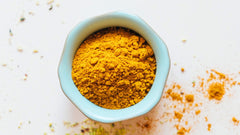
The Golden Spice (Turmeric)

Golden Spice (Turmeric)
Turmeric, also known as Curcuma longa, is a popular spice commonly used in Indian cuisine. It is a member of the ginger family and has a bright yellow color, which comes from the active ingredient curcumin. In addition to its culinary uses, turmeric has a long history of being used in Ayurvedic medicine, where it is believed to have a wide range of health benefits. In this blog post, we will explore some of the health benefits of turmeric and how you can incorporate it into your diet.
Anti-inflammatory properties:
Curcumin, the active ingredient in turmeric, is a powerful anti-inflammatory agent. Inflammation is the body's natural response to injury or infection, but when it becomes chronic, it can lead to a range of health problems, including heart disease, cancer, and Alzheimer's disease. Studies have shown that curcumin can help to reduce inflammation in the body and may be effective in treating conditions such as rheumatoid arthritis and inflammatory bowel disease.
Antioxidant properties:
Turmeric is also a potent antioxidant, which means it can help to protect your cells from damage caused by free radicals. Free radicals are unstable molecules that can cause oxidative stress, which is linked to a range of chronic diseases, including cancer, heart disease, and Alzheimer's disease. By consuming foods rich in antioxidants, such as turmeric, you can help to protect your cells from damage and reduce your risk of developing these conditions.
Improved brain function:
Research has shown that curcumin may have neuroprotective properties, which means it can help to protect the brain from damage and improve cognitive function. Studies have shown that curcumin may be effective in treating depression, Alzheimer's disease, and Parkinson's disease, and may also help to improve memory and concentration.
Lowered risk of heart disease:
Heart disease is one of the leading causes of death worldwide, and research has shown that turmeric may help to lower your risk. Studies have shown that curcumin can help to improve the function of the lining of the blood vessels, which can improve blood flow and reduce your risk of developing heart disease. Curcumin may also help to reduce cholesterol levels and lower your risk of developing blood clots.
How to incorporate turmeric into your diet:
Turmeric is a versatile spice that can be used in a range of dishes. It is commonly used in Indian cuisine, but can also be added to soups, stews, curries, and even smoothies. Here are some ideas for incorporating turmeric into your diet:
- Add turmeric to rice or quinoa to add flavor and color.
- Mix turmeric into scrambled eggs or tofu for a nutritious breakfast.
- Add turmeric to soups and stews for added flavor and health benefits.
- Make a turmeric latte by mixing turmeric with almond milk and honey.
- Add turmeric to roasted vegetables for a tasty side dish.
In conclusion, turmeric is a spice that not only adds flavor and color to your meals, but also provides a range of health benefits. From reducing inflammation to protecting your cells from damage, turmeric is a powerful superfood that can help to improve your overall health and wellbeing. So why not try incorporating turmeric into your diet today and experience the many benefits for yourself!

